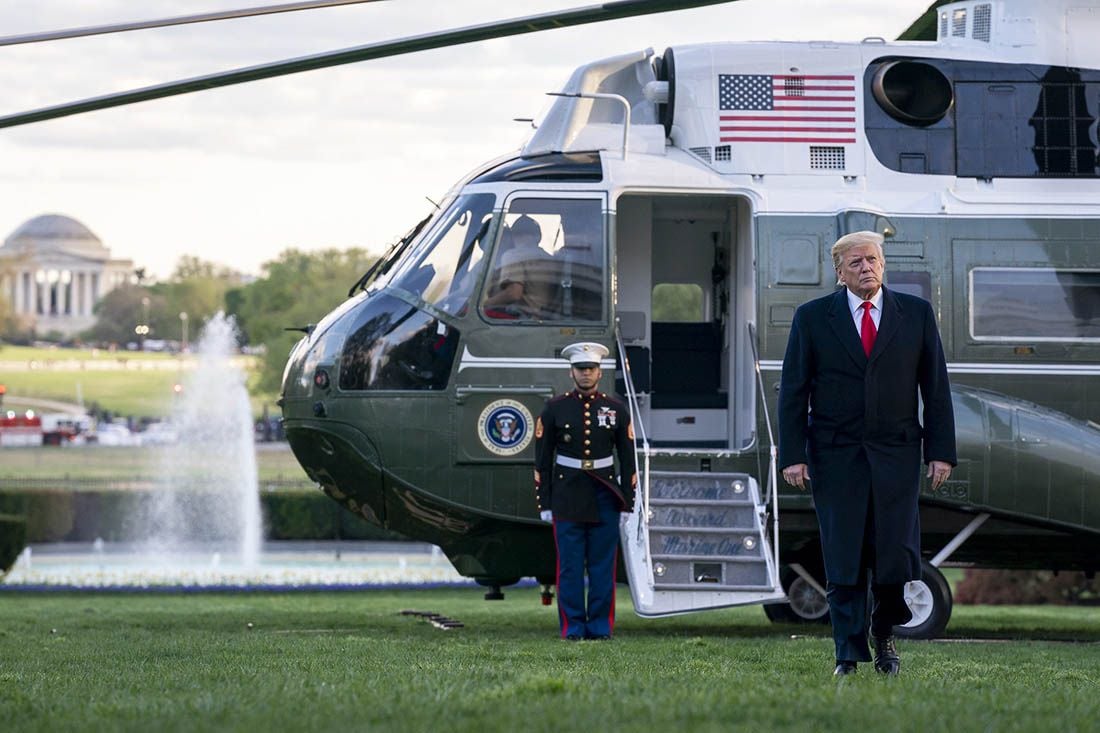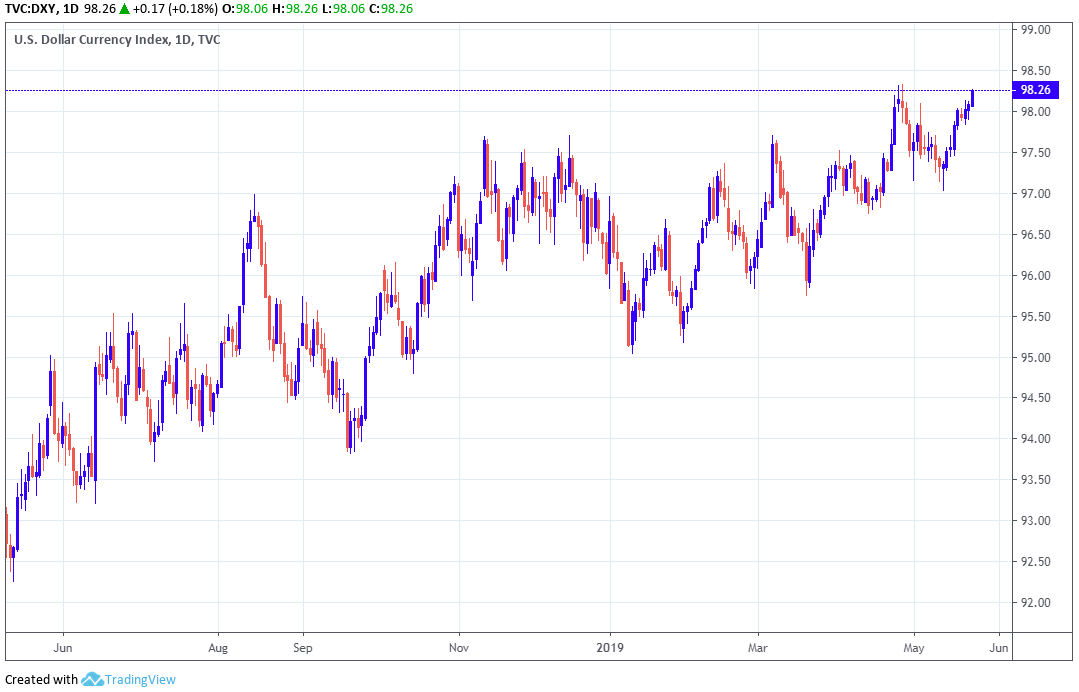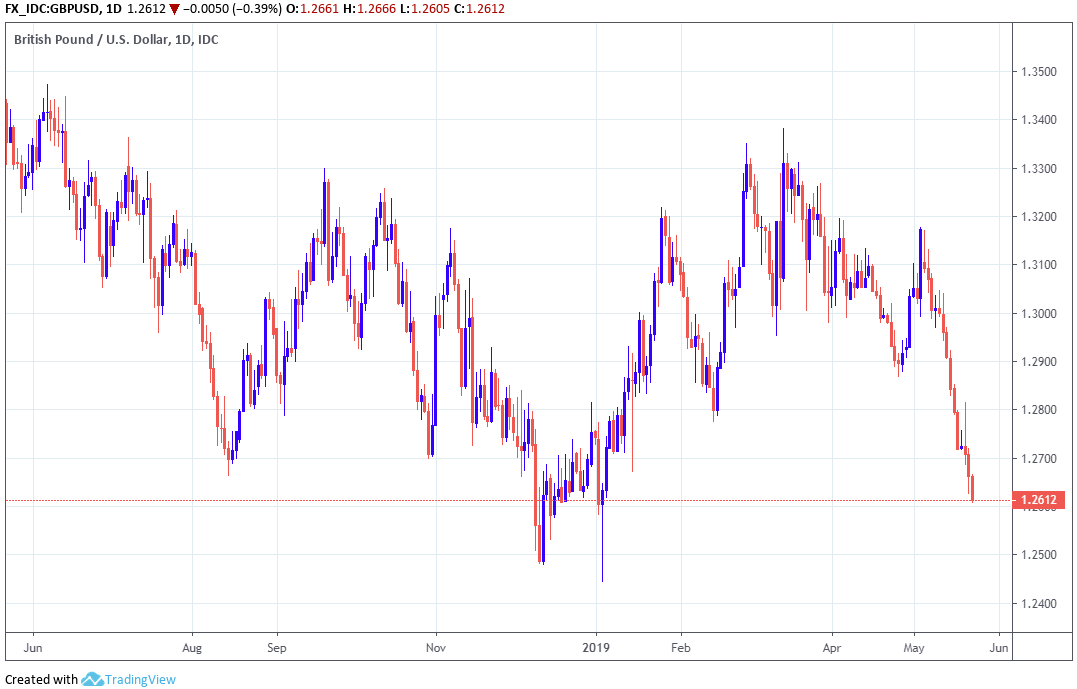Dollar Resilience Endures as 'Trade War' Morphs into All-out Economic Conflict
- Written by: James Skinner

Image © White House
- USD eyes challenge of 2-year high amid mounting trade threats.
- White House adds blacklists to arsenal in U.S.-China trade fight.
- China yet to retaliate but risks is off an all-out economic conflict.
- Comes as global economy slowing, supports the safe-haven USD.
The Dollar is expected by analysts to remain resilient over the coming months, supported by safe-haven demand, because the U.S.-China tariff fight now risks morphing into an all-out economic conflict that could see the Americans attempting to exile Chinese technology firms from western markets.
President Donald Trump has instructed the U.S. Commerce Department to place Chinese tech giant Huawei and more than 60 affiliates onto the 'Entity List' of the Bureau of Industry & Security (BIS), which means U.S. firms must have permission from the government before selling products to them.
The Bureau announced on May 15 that it's adding Huawei to the list for a range of reasons and a number of global firms that aren't headquartered in the U.S. have since been reported to have announced internally that they will no longer do business with Huawei.
BIS officials granted the company a 90-day "limited" reprieve from that ban on May 20, although international companies are still increasingly cutting ties with Huawei. Arm Holdings, a Cambridge-headquartered chip designer that sells intellectual property to Apple Inc, followed suit Thursday according to the BBC.
"Ladies and gentlemen, the Tech Cold War has begun. Of course, there was no reaction from CNH this morning despite China’s industrial crème-de-la-crème about to be potentially defenestrated. But, as I keep stating, that underlines the whole problem," warns Michael Every, an Asia-Pacific strategist at Rabobank.
Western governments have long held concerns about whether allowing Huawei equipment to be used in IT products could eventually become a threat to security, given the leverage that domestic laws give the Chinese state over the privately owned firm. Huawei has hit back at these allegations.
However, exiling Huawei from U.S. and western markets is not the only move attempted by President Trump as he's also now rumoured to be considering adding a range of other Chinese technology firms to the Entity List.
"Yesterday morning Asian time the worry was that the US was about to turn its fire on Chinese surveillance-camera maker Hikvision, which would obviously have proved damaging to that People's-Liberation-Army-linked firm," says Every. "Other Chinese firms are also rumoured to soon be subject to a US ban: Meggvil, Meiya Pico, and Iflytek – all tech/surveillance firms like Hikvision."

Above: ICE Dollar Index shown at daily intervals.
The Dollar index was 0.07% higher at 98.10 Thursday, which puts it within touching distance of a two-year high at 98.33, and is now up 2.2% for 2019.
"Given the unresolved trade war and challenges still faced in Europe, it’s hard to argue with the dollar holding onto gains – though we do still worry that Chinese retaliation could hit US equities at some point. There’s little US data today and instead the focus today will be on European politics and the May PMIs. DXY looks set to nudge to the highest levels of the year near term above 98.33," says Chris Turner, head of FX strategy at ING Group.
The Euro-to-Dollar rate was quoted -0.18% lower at 1.1135 Thursday and has now declined by 2.9% for 2019.
The Pound-to-Dollar rate, meanwhile, has continued its Brexit and trade-driven descent. It was quoted 0.15% lower at 1.2644 Thursday and is now down 0.76% for the year, after having thrown away what was, in February, a 5% gain.
"Trade wars are back on the wires, helping to fuel a correction in risk markets. The Chinese appear to be digging in their heels, noting the start of a "tech trade war." Global equities are sinking lower, which has translated into broad support for the USD and JPY," says Mark McCormick, head of FX strategy at TD Securities. "The backdrop continues to favor the USD across the G10, especially following this morning's lackluster data dump."

Above: Pound-to-Dollar rate shown at daily intervals.
"In China, President Xi inspected a rare earth factory on 20 May in Jiangxi province, and called for the nation to embark on a “new Long March and start all over again” (Jiangxi is where the Communist Party’s Red Army started the Long March in 1934), striking a nationalist tone and sending the message that China is prepared for hardship in the face of a worsening external environment," says Jian Chang, chief economist for China at Barclays in Hong Kong.
Actions against Huawei follow Trump's early-May decision to lift from 10% to 25% the tariff charged on $200 bn of imports from China. That was in response to China allegedly backtracking on commitments made earlier in negotiations aimed at addressing its "unfair trade practices".
However, Trump is also now threatening to impose a 25% tariff on all of China's remaining exports to the U.S.. Those clock up to roughly another $300 bn each year. All of this is bad news for the global economy, which suffered in the second half of 2018 after the initial U.S. tariffs were imposed on imports from China.
China has retaliated against President Trump's trade tariffs by lifting levies on around $60 bn of imports from the U.S. to 25% but it's yet to respond to the move against Huawei. In any case, hopes of a so-called trade deal that would address U.S. concerns and see all tariffs lifted are now fading fast.
"With our belief that China is unlikely to make further concessions unless the US offers compromises, the latest developments suggest our Standoff scenario is materialising and the Escalation scenario is becoming increasingly likely," says Barclays' Chang. "China’s thinking can be summarised by quotes from Hu Xijin, editor-in-chief of China’s Global Times."
Hui Xijin, Editor-in-Chief of China's Communist-Party-sponsored Global Times, suggested in a social media post Wednesday that Trump's decision to move from tariffs to a blacklist might be the result of an eagerness to get a Chinese trade deal done quickly.
There aren't currently any talks scheduled although Trump is set to meet President Xi Jingping during the end-June G20 gathering in Japan.
Xijin also speculated that China's government would likely drag its heels with any future trade talks in response. He is often treated by analysts, investors and media as an unofficial spokesperson of the Chinese government.
It's not a foregone conclusion that retaliation will come any time soon, or at all clear what such a thing will look like. But there's clear scope for a tariff fight to morph into an all-out economic conflict, which has got markets nervous.
"Bannon publicly advocated driving Huawei out of Western markets & shutting it down. In China, even the most radical opinion leader won’ t call for driving Apple or McDonald’s out of Chinese market. Political elites like Bannon are turning the US into an economic fascist country," Xijin wrote in a social media post.
Time to move your money? Get 3-5% more currency than your bank would offer by using the services of foreign exchange specialists at RationalFX. A specialist broker can deliver you an exchange rate closer to the real market rate, thereby saving you substantial quantities of currency. Find out more here.
* Advertisement




